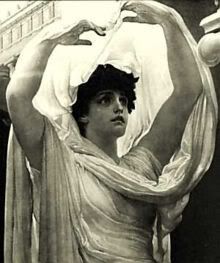The Vestal Virgins

Check out the wikipedia article on the Vestal Virgins for an interesting read.
I've often wondered how seriously the Greeks and Romans took their religious lives. They certainly had extensive mythologies, ceremonious feasts, and armies of priests and priestesses.
The cult of Vesta was a curious group among the many Roman religious societies. The Vestal virgins were a group of women hand-picked as girls to serve in the temple of Vesta. Their main job was to keep the fire of Vesta burning. Other duties included keeping track of wills and testimonies.
The virgins also had some unusual privileges. Whenever they attended a public ceremony they traveled in a covered two-wheel carriage. They were preceded by a special government official who ensured they had the right of way.
They could free criminals by touching them. Their testimony was considered unassailable, so they were not sworn in for court cases. Unlike all other Roman women they were free to make a will, vote, and acquire property. The penalty for injuring one of them was death.
Historians note the Roman religious culture was rich in pageantry. Everything was done in a very showy way. If there was any kind of public perception that a Vestal virgin had not lived a perfectly chaste life, she was immediately executed. The wikipedia article states: "The method by which it was established that a Vestal had committed an offense would be considered uncivilized by today's standards."
I wonder if this in some way demonstrates the true nature of Roman religion: when the public disapproved it no longer carried any meaning.
The lifestyle of the Vestal virgin reminds me in some ways of the pomp and role-playing among the Pharisees during Jesus' day. The religious leaders loved the seats of honor at banquets, longed to be addressed by titles, and wore their religious vestiments in such a way as to attract as much attention as possible.
But Jesus commanded his disciples not to call one another "teacher" or "father". And he commanded them not to pray loudly in the streets for people to hear, but to pray privately. And he told them to obey the religious leaders, but not to become like them because they did not practice what they preached.
Jesus also said his disciples were not to be like the pagans who lord power over one another. He insisted the greatest person in his kingdom would be the one who made himself the servant of all.
Perhaps Jesus was contrasting his kingdom to the Roman religious cults.
All speculating aside, the historical difference between paganism and Christianity was inwardness. The early Christians maintained their faith against brutal public opposition while the pagans contended vigorously for public praise.
If the Vestal virgins were publicly opposed, I doubt they would have stayed committed for long ... a Danish writer once suggested that the power of the pagan gods came from those who practiced their rituals and rites. But in Christianity the opposite is true: the disciples of Christ are empowered from Christ.
Unfortunately the pagans of Rome considered the public prominence of their gods to be the greatest matter at hand. Christianity, on the other hand considers the inward prominence of obedience to be the greatest matter at hand.


0 Comments:
Post a Comment
<< Home